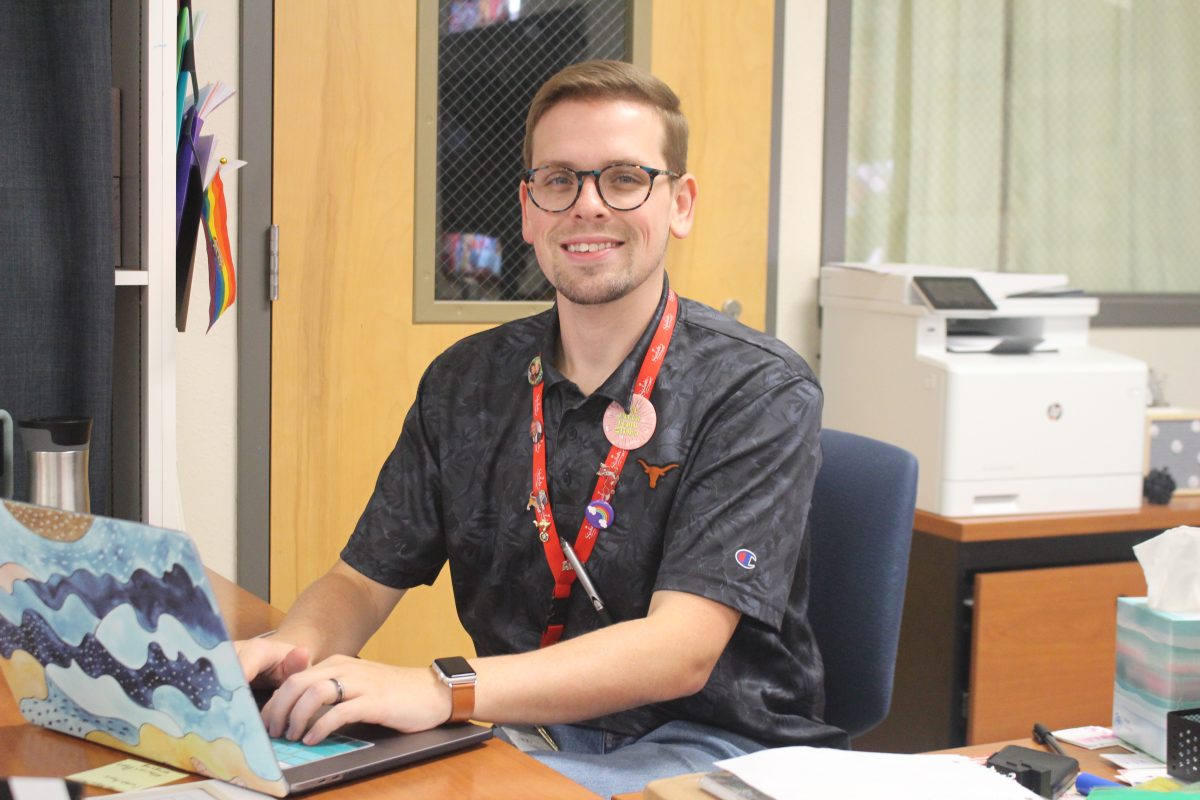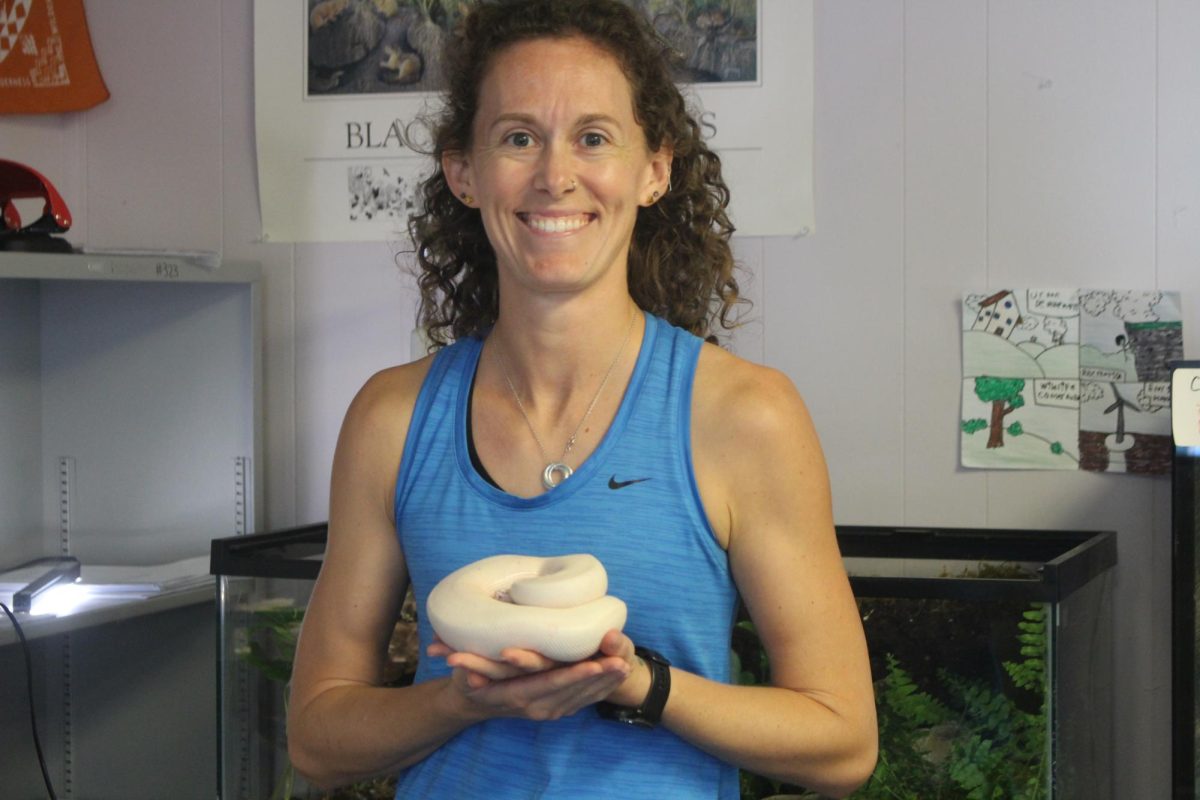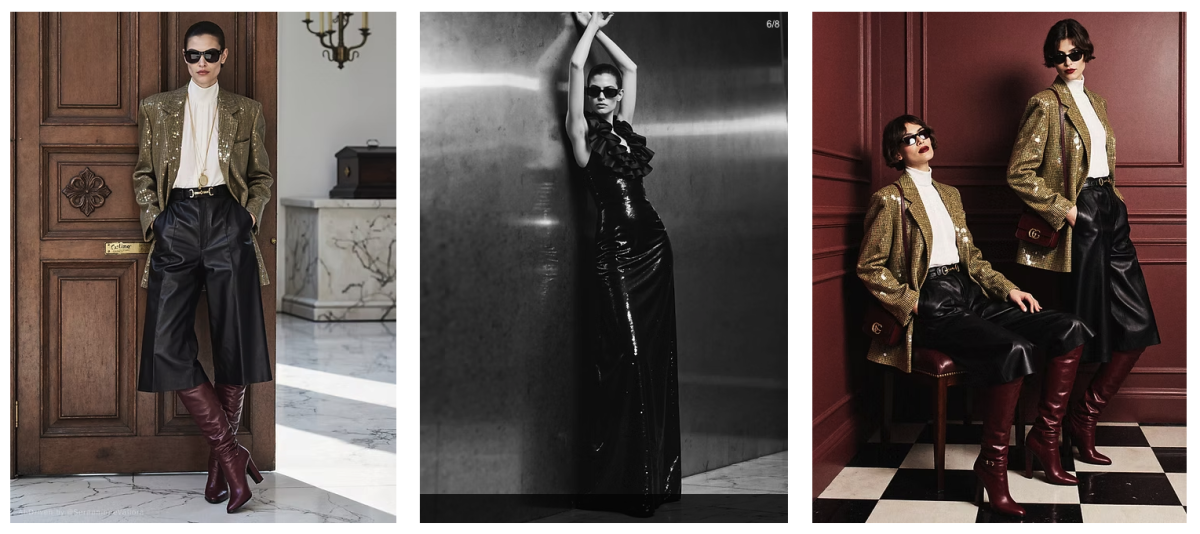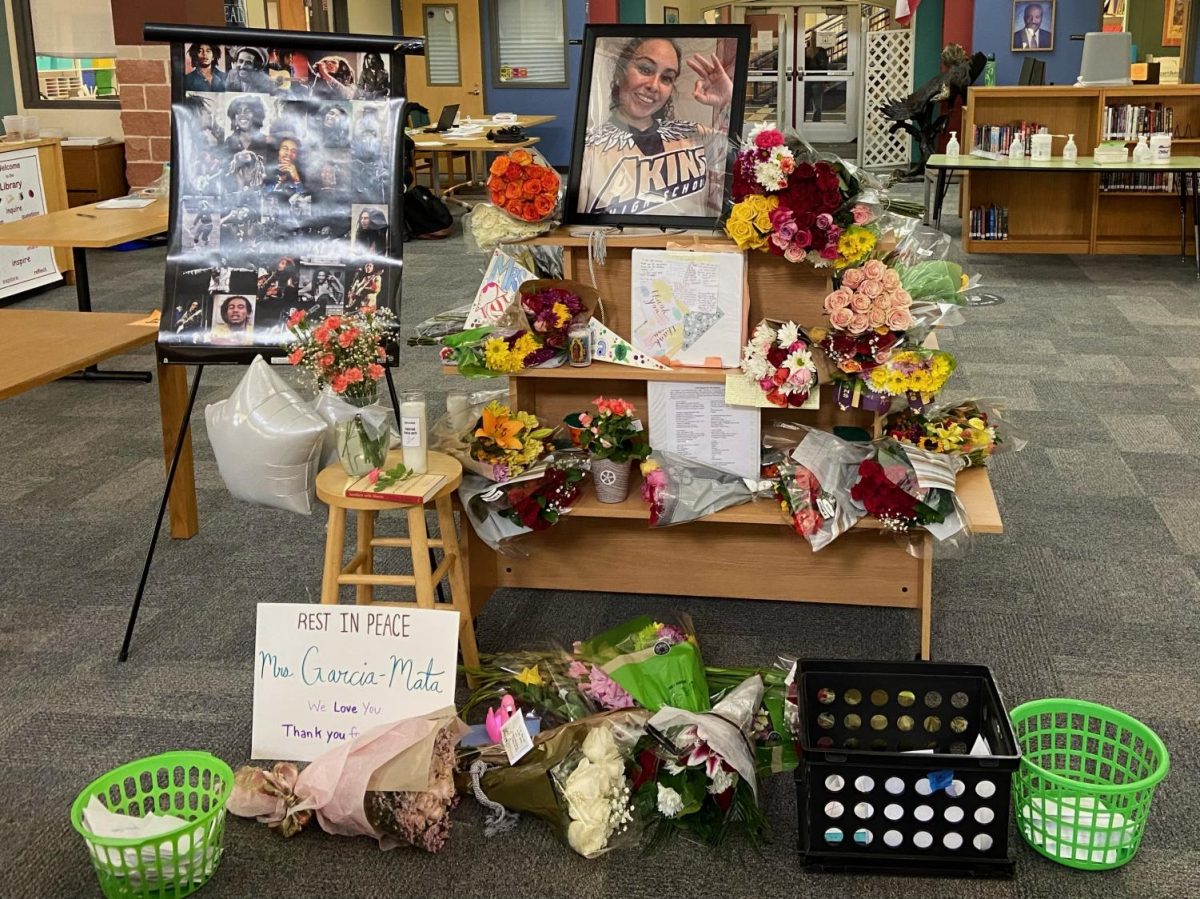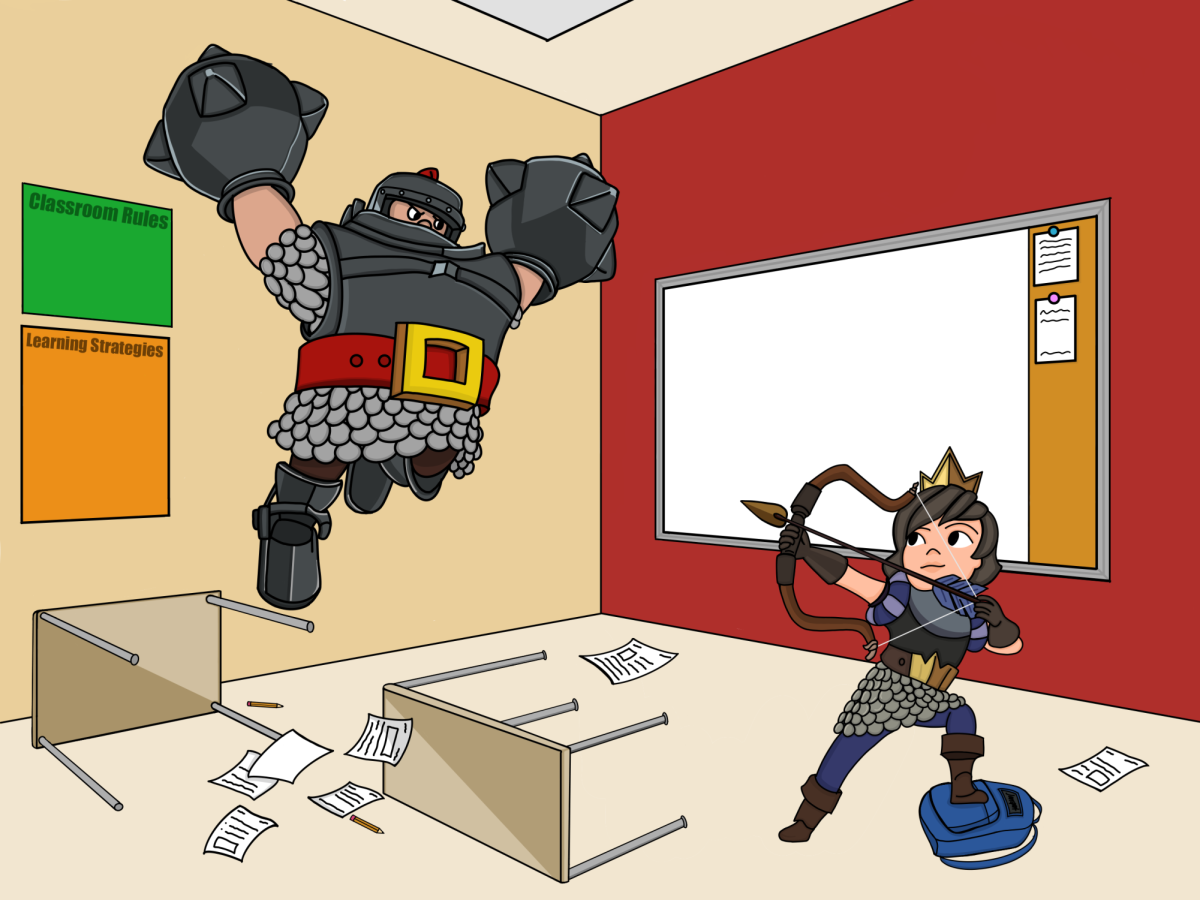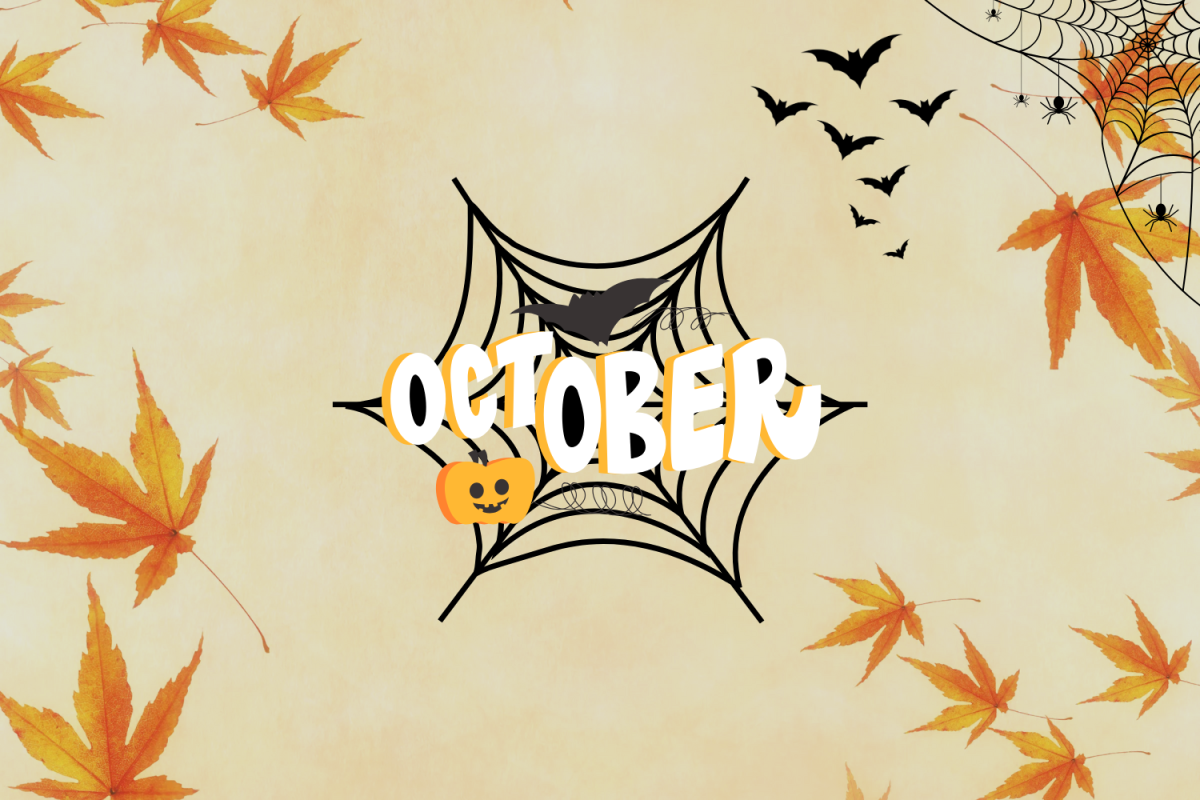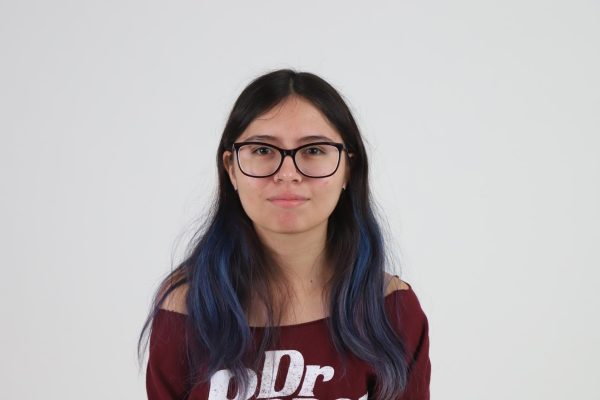Kyle Monk is an audio & video production teacher in his fourth year as a teacher at Akins, having started during the 2020-2021 school year, which was unique because most students worked remotely from home because of the COVID-19 pandemic.
He’s in his second year serving as the academy coordinator for the New Tech Academy, giving him the responsibility to facilitate events and programs for the academy. The Eagle’s Eye interviewed Monk to learn more about what motivates him as a teacher.
Eagle’s Eye: Why did you choose this career?
Kyle Monk: I actually started out my career in marketing for a tech company. My degree in college was in Radio, TV, Film, and Advertising. I went the advertising route and worked in marketing and realized super quickly that it was not where I was supposed to be. I had always had a pull — like I knew I wanted to be in education. So when I was looking to transition out of my career in marketing, I kind of stopped and thought about what is it that I wanted to do? What was my passion? Where did I want to be for the rest of my life? And I decided on education. So I did an alternative certification program to become a teacher and landed in the best school and the best job in the world.
EE: Was the switch difficult to go from marketing to teaching?
KM: Yeah, definitely an entirely different skill set. I would say that it’s a lot easier to work with students than it is to work with adults. Yeah, it’s very surprising. But I think the switch was made easier for me because this is kind of always what I wanted to do, and I’ve known that and just kind of ignored it throughout my life. So it was definitely a huge adjustment, and I had to learn a lot about the world of education, but I’m super glad that I did.
EE: Did you have a reason to ignore why you wanted to teach?
KM: Yeah. You know, all the reasons that you’re told like don’t become a teacher. Like everyone, all you hear about education is oh, you’re underpaid. You’re overworked. You’re not valued by society. Oh, you’re just a teacher. Like a phrase that was really big when I was growing up that I don’t know if it still really exists. But the phrase is, “if you can’t do, then teach.” So like if I couldn’t be successful in the film industry, come teach film, you know. I let all of those things sink in and kind of let my ego get in the way of “no, I can do so I’m gonna go do, I’m not going to teach.” That’s what I kind of let get in the way of following that passion, and now that I have I’m much happier than I was in my miserable marketing job.
EE: How did you become a coordinator?
KM: There’s an application process and you have to meet with the assistant principal and the counselor of the academy and they run interviews for all of the interested candidates. So it’s something that you have to volunteer for. It’s kind of like, a little bit more of a leadership position where you can be a part of the leadership on campus while also still being in the classroom and I love that because I like being able to be one of the leadership team members for the New Tech Academy while also still getting to be in the classroom with all of my students.
EE: Why did you choose to become a coordinator?
KM: I think I wanted to be an academy coordinator because I saw the impact that the academy coordinator has on the academy, which sounds like, well of course, they’re the academy coordinator. But I mean it more in terms of like I as the academy coordinator, I get the chance to focus on Academy spirit and Academy culture and making New Tech the best academy on campus at Akins. I also get the opportunity to help our New Tech students figure out what it is they want to do after they graduate. “What are your plans? What are your goals?” So it’s an opportunity for me to still be inside of my classroom teaching and doing what I love, while also getting to step back and look at like a higher overview of all of the students in the academy and where they’re headed.
EE: How different is it from being a teacher to a coordinator?
KM: I would say that you use a lot of the same skills. But the nice thing about being an academy coordinator, there are a lot of nice things about being an academy coordinator. But the biggest switch in mindset and skills is I have to go from being a teacher and a resource for my students to then being a resource and a super knowledgeable teacher for all of the teachers inside of my academy. So in the classroom, I get to use my knowledge of the school. I use my knowledge of my content and teach the film pathway. Whereas in the academy coordinator position, I’m thinking more high level about what are the strategies that we want to see teachers using in the classroom, working with our administration team. How do we want to roll out policies, are policies helping or hurting students, so all of it is super student and campus-focused. It’s just kind of shifting how you’re using your skills and your knowledge to put it into practice.
EE: How was your first day as a teacher?
KM: I actually started teaching at Akins in the Fall of 2020. So I taught when we were fully virtual, so I missed the whole we came to school, left for spring break, and never came back. I missed that portion. But I came in when everyone came back to school on Zoom. So my first day was, I would say incredibly atypical because, first of all, the start date of the school year got pushed back by two weeks.
So the first day that I was prepared to teach, we didn’t, and then when I did actually teach, I was sitting in the second bedroom of my apartment in front of my computer and I was wearing gym shorts and a Polo because the Polo was all you could see on the camera, and I was teaching to a screen of little black boxes on Zoom. That was my first day of teaching overall, and it was super weird, and I was like, this kind of feels like when I would run meetings at my corporate job because it felt a lot safe, like very similar to what I did there. But my first day, like, actually in the classroom with students was the Fall of 2021, and I was terrified. It was a super good day. It was great to get to meet all of my students and kind of see what it’s like to be in the classroom. But before my first class started, the bell rings at 8:50 every day. At like 8:45, I was sitting at my desk, and like my hands were shaking, and I was like “OK, you’ve got this. You’ve got it. You’re good to go.” But as soon as the day started, and I fell into it, it got easier, and it was kind of solidified that I was where I wanted to be.
EE: What do you enjoy the most about being here?
KM: I love a lot about Akins. My favorite part of Akins is the people, like, all the people. Whether it’s the administration, my fellow teachers, or the students. Everyone here is, this is so cliche, but everyone here just feels really special. People here care about one another, at least from the teacher’s perspective it feels that way. A super supportive community and we’re an incredibly diverse community, like walking through the halls. It doesn’t look like we look at every single school. So I think that there’s a really rich culture here at Akins because of the people that are here and that’s what I love the most.
EE: What would you say has been the most difficult about being/ working here?
KM: Honestly, the thing that’s been super difficult is the amount of change that we go through. Whether it be teachers who are leaving, or administration who is leaving. Over the past few years, there’s just been a lot of switching up and moving around, which I totally understand for career growth opportunities or doing what’s best for you in your life. But it’s interesting because you really start to get to know these people and build relationships with them and you really enjoy working with them and then they move on, and then there’s someone else that comes in and there’s like a new learning curve of “oh, here’s how things work here, here’s how we do things here.” So there’s just been a lot of change over the past few years, which is a good thing for sure. But it’s definitely made things difficult.
EE: How would you describe your teaching style?
KM: I would say that my teaching style is that I really try to adapt to the learners that are in the room. I never experienced classes growing up and even through college that, it never felt like the teacher was trying to meet the different learning styles that are in the room. And I really focus in on what are the different ways that I can get you all the information that you need to learn because of the class that you’re in. But how can I do it in a way that interests you, and that is beneficial for your learning style, all while trying to make it relevant to the things that all of my students are interested in outside of my classroom? So not just like, yes, you might love film, but I know you have 82 other interests other than film. So trying to bring in the likes and interests and desires of my students while also delivering all of the information you need to know about film and using cameras and editing in a way that’s most beneficial to each of the learners in the room. So it’s a combination of I take my content and then I try to break it up into different delivery methods that meet different needs in the room.
EE: What techniques do you use to keep your students engaged and motivated in the lesson?
KM: I try my hardest to vary up what it is that we’re doing. So ideally, there’s never a day where you are sitting and listening to me for the whole period or you’re sitting and watching one thing on the computer for the whole period unless that’s something you choose for the day. I try to kind of vary the tasks or vary the things that you’re focusing on so that your brain doesn’t get exhausted from doing one thing the entire time. Some topics that we cover, there’s not a super easy way around that and we’ve just got to kind of trudge through it. But a lot of the things that we do, I think there’s a way for y’all to choose the way that you do it. Where you can showcase the skills that I’m trying to get you to learn while you’re still doing something that you’re interested in. So just kind of switching up focus every once in a while, trying to be systematic about it, and trying to give y’all breaks, because no one’s brain can focus and just be on one thing for 90 minutes at a time. So giving y’all some time to just sit, reflect, and give your brain a little break throughout the whole class period.
EE: Is teaching any different from what you imagined?
KM: I would say yeah, it is different than I imagined, not from the standpoint of like, I know my ultimate goal is to bring students into my classroom, learn the content of my course, and then hopefully stick with me for four years but if not, walk away with skills that you can use in your life. What I did not expect kind of, I guess there are kind of three parts of teaching I didn’t expect. The first part I didn’t expect is to love it as much as I do. Like I knew I wanted to be a teacher but genuinely, I absolutely love teaching like I don’t know if there’s anything else that I would want to do. The second thing would be I did not expect to get as invested in my students as I do, which sounds like a terrible thing like teachers shouldn’t be invested in their students.
But one of my favorite parts of teaching is throughout the year getting to know y’all and those things you’re interested in outside of class and seeing how you can apply what we’re learning to those things that you love already. So just kind of being invested in y’all as people because I didn’t really have that in teachers. It was like I’m here to teach my lesson for the day, do your work, and turn it in. But I didn’t expect to become as invested as I do get throughout the year in each of my students.
And I also, I guess the third thing that wasn’t really expected for me was to come into a school where other teachers and administrators are so supportive of what’s going on inside of every classroom here. You hear a lot in your pre-service program of becoming a teacher about how the reality versus the expectation of teaching typically, there’s way more demand on you, that you always feel like you’re under a microscope of are you doing this right? Are you doing this right? But that hasn’t been the case here at all. Everyone is super supportive. Everyone learns from each other, the administration loves to see what we’re doing, and they let us know like we love to learn from you too. So I guess I didn’t expect as supportive of an environment as I’m in. So I would say those are the three big things that I didn’t expect coming into teaching that I’ve definitely loved.
EE: How would you like your students to remember you?
KM: I would say that my goal as a teacher would be if a student leaves my classroom, not remembering anything about film or filmmaking techniques, or the editing software that we use or setting up a film shoot, if they remember nothing about film, I really want them to walk away remembering that they have or had a teacher who cares about them. That is my biggest goal. I want all of my students to know that I want to be their biggest cheerleader. I want to be someone that they can talk to about things. I want to be someone that they know is invested in their future, whatever that may be. If it’s helping work through college applications, or finding that post-high school job or career military readiness, all of that kind of stuff. I just want my students to remember that they have someone who is an advocate for them and who cares about them and what they want to do with their life.
EE: What advice would you give yourself in your first year of teaching?
KM: The advice I would give myself in my first year teaching would be that you don’t know it all and that’s OK, and you don’t have to have it all together in your first year. I put a lot of pressure on myself to seem like I was the perfect teacher. I didn’t want to come in and have the students be like, oh, a newbie. Let’s see how much we can get away with this one, and so I tried really hard to act like oh, I had it all together. I’d been doing this forever, everything’s great. And that led very close to like, burnout for me or like, gosh. Am I doing what I’m supposed to be doing? And I think if I had just stepped back and realized like, this is my first year in a new career, and I’m learning everything there is to know about it in real-time. I would have been a lot less stressed and a lot happier in my day-to-day teaching. So I think that if I just told myself, you don’t have to have it all figured out. You’re gonna make mistakes and that’s okay, that’s how you learn. If I had practiced what I preach to my students in my first year, I think that would have made things a lot easier for me.

